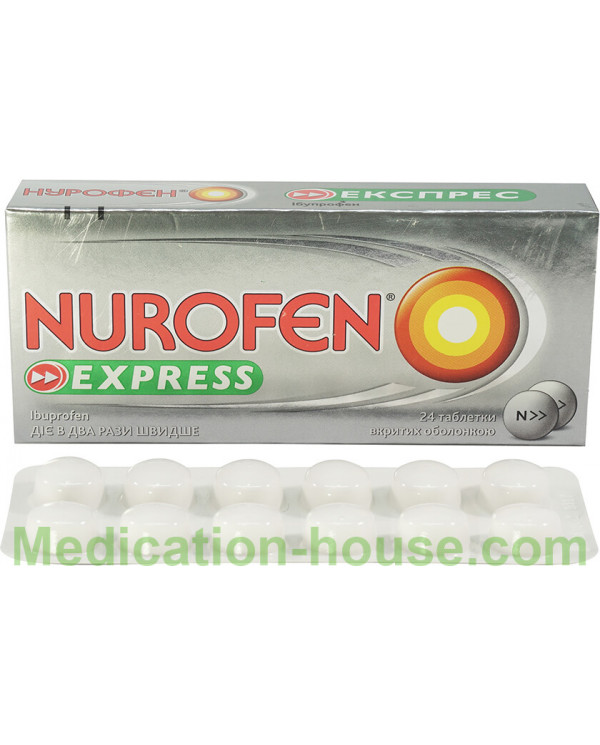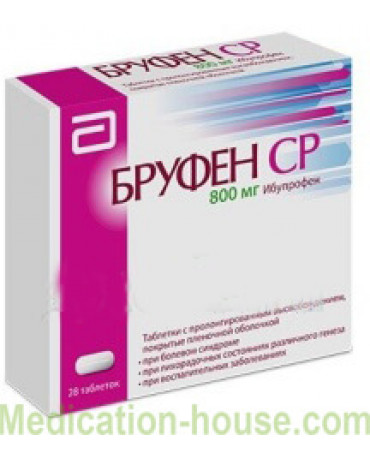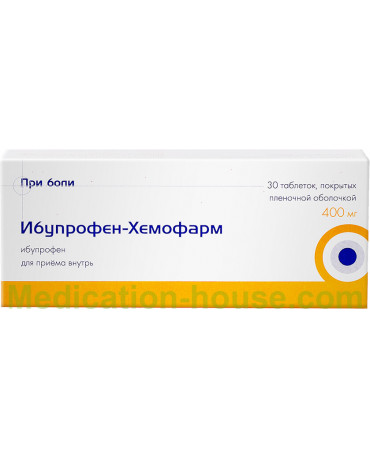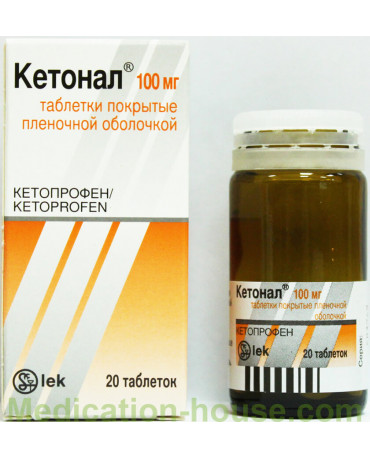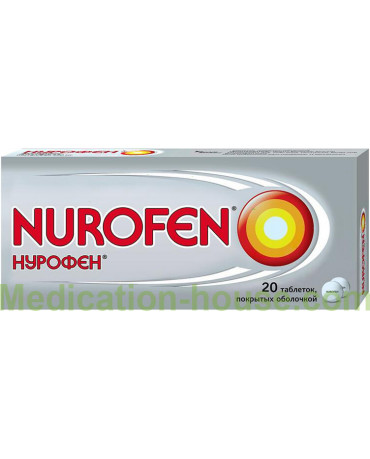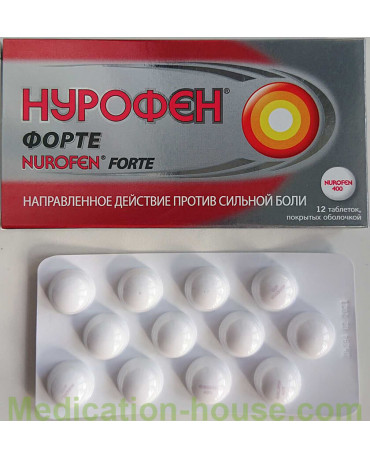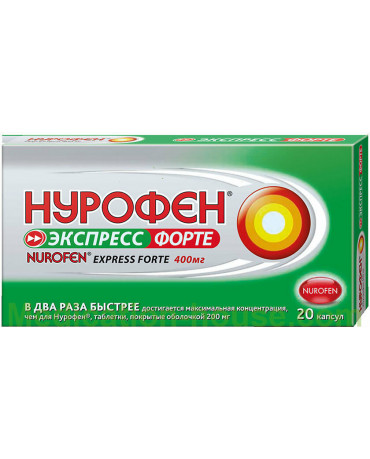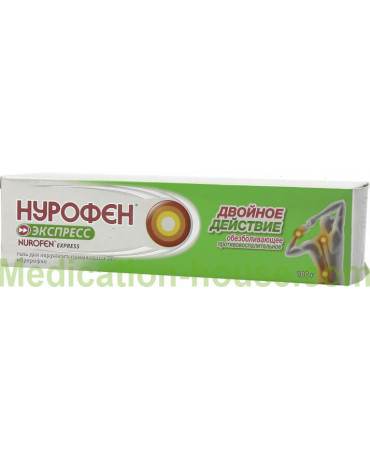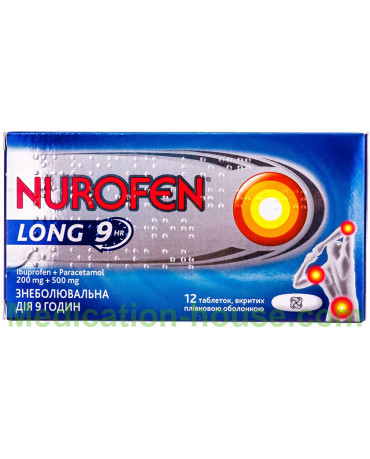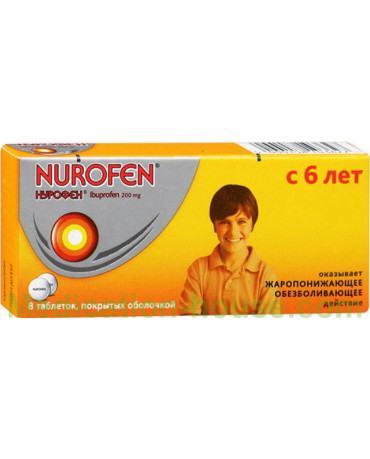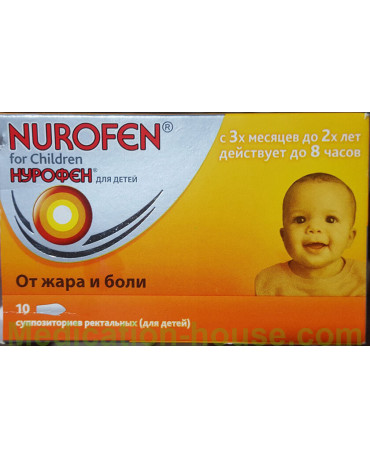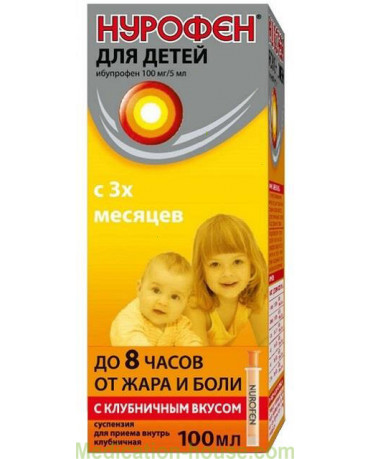Instruction for Nurofen Express
You can buy Nurofen Express here
Composition
One capsule contains
active ingredient - ibuprofen 200 mg
excipients: macrogol 600, potassium hydroxide, purified water
capsule shell: gelatin, sorbitol 76% solution, crimson dye [Ponso 4R] (E 124), purified water, opacode WB NS-78-18011 (purified water, titanium dioxide (E 171), propylene glycol, isopropanol, HPMC 2910 / hypromellose 3cP).
Description
Oval capsules with a red translucent gelatin shell, with the identifying inscription in white NUROFEN, containing a clear liquid from colorless to slightly pink.
Pharmacotherapeutic group
Anti-inflammatory and antirheumatic diseases
Non-steroidal anti-inflammatory drugs Propionic acid derivatives, Ibuprofen
Pharmacokinetics
Absorption - high, quickly and almost completely absorbed from the gastrointestinal tract (GIT). After taking 2 capsules on an empty stomach, ibuprofen is detected in the blood plasma after 15 minutes, the maximum concentration (Cmax) of ibuprofen in the blood plasma is reached after 30-40 minutes, which is two times faster than after taking the equivalent dose of Nurofen in the dosage form 200 mg coated tablets. Taking Nurofen Express with food can increase the time to reach the maximum concentration (TCmax). Communication with plasma proteins is more than 90%, the half-life (T1 / 2) is 2 hours. Slowly penetrates into the cavity of the joints, lingers in the synovial fluid, creating in it greater concentrations than in the blood plasma. After absorption, about 60% of the pharmacologically inactive R-form slowly transforms into the active S-form. Metabolized in the liver. Excreted by the kidneys (in unchanged form, not more than 1%) and, to a lesser extent, with bile.
Older people did not find significant differences in the pharmacokinetic profile of Nurofen Express compared with younger people.
In limited studies, ibuprofen has been detected in breast milk at very low concentrations.
Pharmacodynamics
The mechanism of action of ibuprofen, a derivative of propionic acid from the group of nonsteroidal anti-inflammatory drugs (NSAIDs), is due to the inhibition of the synthesis of prostaglandins - mediators of pain, inflammation and hyperthermia. Indiscriminately blocks cyclooxygenase-1 (COX-1) and cyclooxygenase-2 (COX-2), thereby inhibiting the synthesis of prostaglandins. It has a quick directional effect against pain (pain reliever), antipyretic and anti-inflammatory effect. In addition, ibuprofen reversibly inhibits platelet aggregation.
Indications for use
- symptomatic treatment of mild or moderate headache, toothache, painful menstruation; fever with flu and colds.
Dosage and administration
Carefully read the instructions before taking Nurofen Express.
For oral administration. For short term use only.
Adults and children over 12 years old (more than 40 kg): by mouth 1 capsule (200 mg), without chewing, up to 3-4 times per day. The capsule should be washed down with water. The interval between doses of Nurofen Express should be 6-8 hours.
To achieve a faster therapeutic effect in adults, a single dose can be increased up to 2 capsules (400 mg) up to 3 times per day.
The maximum daily dose is 1200 mg.
The maximum daily dose for children 12-17 years old is 1000 mg.
If while taking Nurofen Express for 2-3 days the symptoms persist or worsen, it is necessary to stop treatment and consult a doctor.
Side effects of Nurofen Express
The frequency of adverse reactions was estimated based on the following criteria: very often (≥ 1/10), often (from ≥ 1/100 to <1/10), infrequently (from ≥ 1/1000 to <1/100), rarely ( from ≥ 1/10 000 to <1/1000), very rarely (> 1/10 000).
Infrequently:
- non-specific allergic reactions and anaphylactic reactions, reactions of the respiratory tract (bronchial asthma, including its exacerbation, bronchospasm, shortness of breath, dyspnea), skin reactions (itching, urticaria, angioedema, exfoliative and bullous dermatoses, toxic epidermal necrolysis, syndrome Stevens-Johnson, erythema multiforme), allergic rhinitis, eosinophilia
- abdominal pain, nausea, dyspepsia (including heartburn, bloating)
- headache
Seldom:
- diarrhea, flatulence, constipation and vomiting
- papillonecrosis, nephritic syndrome (especially with long-term use), in combination with an increase in the concentration of urea in the blood plasma and the appearance of edema, hematuria and proteinuria
Very rarely:
- hematopoietic disorders (anemia, leukopenia, aplastic anemia, hemolytic anemia, thrombocytopenia, pancytopenia, agranulocytosis)
- severe hypersensitivity reactions, including swelling of the face, tongue and larynx, shortness of breath, tachycardia, hypotension (anaphylaxis, angioedema or severe anaphylactic shock)
- peptic ulcer, perforation or gastrointestinal bleeding, melena, hematemesis, in some cases with a fatal outcome (especially in elderly patients), ulcerative stomatitis, exacerbation of colitis
- abnormal liver function (especially with long-term treatment), hepatitis and jaundice, nephrotic syndrome, acute renal failure (compensated and decompensated), interstitial nephritis, cystitis
- aseptic meningitis
- swelling, including peripheral
- reduction of hematocrit or hemoglobin
- increase bleeding time
- decrease in concentration of glucose in a blood plasma
- reduction of creatinine clearance
- increase plasma creatinine concentration
- increased activity of liver transaminases
Frequency unknown:
- exacerbation of colitis and Crohn's disease
- heart failure, peripheral edema, with long-term use increased risk of thrombotic complications (for example, myocardial infarction), increased blood pressure
- bronchial asthma, bronchospasm, shortness of breath.
If you experience side effects, you should stop taking Nurofen Express and consult a doctor.
The risk of side effects can be minimized if Nurofen Express is taken in a short course, at the minimum effective dose needed to eliminate the symptoms.
Side effects are predominantly dose-dependent.
The following adverse reactions were observed with short-term ibuprofen in doses not exceeding 1200 mg / day (3 capsules).
Contraindications for Nurofen Express
- hypersensitivity to ibuprofen or any of the components that make up Nurofen Express
- history of hypersensitivity reactions (bronchial asthma, bronchospasm, rhinitis, rhinosinusitis, recurrent polyposis of the nose or paranasal sinuses, angioedema, urticaria) associated with the use of acetylsalicylic acid (salicylates) or other NSAIDs
- severe dehydration (as a result of vomiting, diarrhea, or insufficient fluid intake)
- erosive and ulcerative diseases of the gastrointestinal tract (including gastric ulcer and duodenal ulcer, Crohn's disease, ulcerative colitis) or ulcerative bleeding in the active phase or in history (two or more confirmed episodes of peptic ulcer or ulcerative bleeding)
- Bleeding or perforation of the ulcer of the gastrointestinal tract in history, provoked by the use of NSAIDs
- severe liver failure or liver disease in the active phase
- severe renal failure (creatinine clearance <30 ml / min), confirmed hyperkalemia
- decompensated heart failure; period after coronary artery bypass surgery
- hemophilia and other bleeding disorders (including hypocoagulation), hemorrhagic diathesis
- fructose intolerance
- intracranial hemorrhage
- pregnancy (III trimester)
- children's age up to 12 years
Drug interactions
The simultaneous use of ibuprofen with the following drugs should be avoided:
Acetylsalicylic acid (with the exception of low doses of acetylsalicylic acid, not more than 75 mg per day, prescribed by a doctor), because the combined use may increase the risk of side effects. With simultaneous use of ibuprofen reduces the anti-inflammatory and antiplatelet effect of acetylsalicylic acid (it is possible to increase the incidence of acute coronary insufficiency in patients receiving small doses of acetylsalicylic acid as an antiplatelet agent after starting ibuprofen).
Other NSAIDs, including selective COX-2 inhibitors: the simultaneous use of two or more drugs from the NSAID group should be avoided due to the possible increase in the risk of side effects.
With caution should be used simultaneously with the following drugs:
Anticoagulants: NSAIDs can enhance the effect of anticoagulants, in particular, warfarin and thrombolytic drugs.
Antihypertensive drugs (ACE inhibitors and angiotensin II antagonists) and diuretics: NSAIDs may decrease the effectiveness of drugs in these groups. Diuretics and ACE inhibitors can increase the nephrotoxicity of NSAIDs.
Corticosteroids: an increased risk of gastrointestinal ulcers and gastrointestinal bleeding.
Antiplatelet agents and selective serotonin reuptake inhibitors: an increased risk of gastrointestinal bleeding.
Cardiac glycosides: the simultaneous appointment of NSAIDs and cardiac glycosides can lead to aggravation of heart failure, a decrease in the glomerular filtration rate and an increase in the concentration of cardiac glycosides in the blood plasma.
Lithium preparations: there are data on the likelihood of increasing the concentration of lithium in the blood plasma during the use of NSAIDs.
Methotrexate: there are data on the likelihood of increasing the concentration of methotrexate in the blood plasma during the use of NSAIDs.
Cyclosporine: an increased risk of nephrotoxicity with the simultaneous appointment of NSAIDs and cyclosporine.
Mifepristone: NSAID should be started no earlier than 8-12 days after taking mifepristone, since NSAIDs can reduce the effectiveness of mifepristone.
Tacrolimus: with the simultaneous appointment of NSAIDs and tacrolimus may increase the risk of nephrotoxicity.
Zidovudine: simultaneous use of NSAIDs and zidovudine can lead to increased hematotoxicity. There is evidence of an increased risk of hemarthrosis and hematomas in HIV-positive patients with hemophilia who received joint treatment with zidovudine and ibuprofen.
Quinol antibiotics: in patients receiving joint treatment of NSAIDs and quinolone antibiotics, the risk of seizures may increase.
Cefamundol, cefoperazone, cefotetan, valproic acid, plicamycin: an increase in the incidence of hypoprothrombinemia.
Drugs that block tubular secretion: a decrease in excretion and an increase in plasma concentration of ibuprofen.
Inductors of microsomal oxidation (phenytoin, ethanol, barbiturates, rifampicin, phenylbutazone, tricyclic antidepressants): an increase in the production of hydroxylated active metabolites, an increase in the risk of developing severe intoxications.
Inhibitors of microsomal oxidation: reducing the risk of hepatotoxic action.
Oral hypoglycemic drugs and insulin, sulfonylurea derivatives: increased effect.
Antacids and colestyramine: reduced absorption.
Caffeine: increased analgesic effect.
special instructions
It is recommended to take Nurofen Express in the shortest possible course and in the minimum effective dose necessary to eliminate the symptoms.
Agents that inhibit cyclooxygenase and prostaglandin synthesis can affect ovulation, impairing female reproductive function (reversible after discontinuation of treatment).
During long-term treatment, it is necessary to control the picture of peripheral blood and the functional state of the liver and kidneys. When symptoms of gastropathy appear, careful monitoring is shown, including esophagogastroduodenoscopy, complete blood count (hemoglobin determination), fecal occult blood test. If necessary, determine the 17-ketosteroids drug should be canceled 48 hours before the study. During the treatment period, ethanol is not recommended.
In the treatment of chronic conditions and long-term use may cause other adverse reactions.
The first symptoms of such disorders are fever, sore throat, superficial oral ulcers, flu-like syndrome, severe weakness, nosebleeds, and subcutaneous hemorrhages, hemorrhages, and hemorrhages of unknown etiology.
Carefully
In the presence of conditions indicated in this section, before using Nurofen Express should consult with your doctor:
- severe somatic diseases, dyslipidemia / hyperlipidemia, diabetes mellitus, peripheral artery disease, smoking, frequent alcohol use, simultaneous use of drugs that may increase the risk of ulcers or bleeding, in particular, oral glucocorticosteroids (including prednisolone), anticoagulants ( including warfarin), selective serotonin reuptake inhibitors (including citalopram, fluoxetine, paroxetine, sertraline) or antiplatelet agents (including acetone) lsalitsilovoy acid, clopidogrel), pregnancy I-II trimester, during breastfeeding, older age.
Respiratory: may develop bronchospasm in patients with asthma or allergic diseases in the acute stage or in history.
Systemic lupus erythematosus or mixed connective tissue disease (Sharpe syndrome): increased risk of aseptic meningitis
Renal failure, including dehydration (creatinine clearance less than 30-60 ml / min), nephrotic syndrome may be exacerbated.
Hepatic dysfunction (liver failure, liver cirrhosis with portal hypertension, hyperbilirubinemia) may be exacerbated.
Arterial hypertension and / or heart failure, cerebrovascular diseases: fluid retention, hypertension, edema are possible.
Blood disorders of unknown etiology (leukopenia and anemia): may be exacerbated.
Impaired reproductive function in women: there is limited evidence that agents that inhibit cyclooxygenase and prostaglandin synthesis can affect ovulation, impairing female reproductive function. Such action is reversible after discontinuation of treatment.
Gastrointestinal tract (GIT): NSAIDs should be used with caution in patients with a history of gastrointestinal diseases (ulcerative colitis, Crohn's disease), since these conditions can be exacerbated. Risk factors include a history of a single episode of gastric ulcer or gastrointestinal tract bleeding,
gastritis, enteritis, colitis, Helicobacter pylori infection, ulcerative colitis.
Gastrointestinal bleeding, an ulcer or perforation of the gastrointestinal wall in the presence of aggravated history can develop without warning symptoms and in some cases can be fatal.
The risk of gastrointestinal bleeding, ulceration or perforation of the gastrointestinal wall and the unfavorable outcome associated with the development of these conditions is higher in elderly patients, especially when taking a large dose of NSAIDs. These patients should receive a short course of treatment at the lowest effective dose.
Patients with gastrointestinal diseases in history, should report any newly emerging abdominal symptoms (especially gastrointestinal bleeding), which often develop in the initial stages of treatment.
This drug contains 14 mg of potassium per dose. This should be taken into account in patients with the need to control the level of potassium in the blood.
Use during pregnancy and during breastfeeding
Although no teratogenic effects have been demonstrated in animal experiments, the use of ibuprofen 200 mg capsules should be avoided during the first 6 months of pregnancy.
In trimester III, ibuprofen is contraindicated, as there is a risk of premature closure of the arterial duct of the fetus with possible persistent pulmonary hypertension. The onset of labor may be delayed, and the duration of action is increased, an increased tendency to bleeding in both the mother and the child is possible.
There is evidence that small amounts of ibuprofen can penetrate into breast milk without any negative consequences for the health of the infant.
Features of influence on ability to steer vehicles, mechanisms.
Patients who notice dizziness, drowsiness, lethargy or visual impairment while taking ibuprofen should avoid driving vehicles or driving machinery.
Overdose
In children, overdose symptoms may develop after a dose of more than 400 mg / kg body weight. In adults, the dose-dependent effect of overdose is less pronounced. The half-life of Nurofen Express in overdose is 1.5-3 hours.
Symptoms: nausea, vomiting, pain in the epigastric region or, rarely, diarrhea, tinnitus, headache and gastrointestinal bleeding. In more severe cases, there are manifestations of the central nervous system: drowsiness, rarely - excitement, convulsions, disorientation, coma. In cases of severe poisoning, metabolic acidosis and an increase in prothrombin time, renal failure, liver tissue damage, a decrease in blood pressure, respiratory depression and cyanosis can develop. Patients with bronchial asthma may worsen this disease.
Treatment: gastric lavage for 1 hour after taking a potentially toxic dose of ibuprofen, taking activated charcoal. If necessary, symptomatic treatment, with the mandatory provision of airway patency, monitoring of ECG and basic vital signs until the patient's condition is normalized. If ibuprofen has already been absorbed, an alkaline drink may be given to remove the acidic ibuprofen derivative by the kidneys, forced diuresis. Frequent or prolonged seizures should be stopped by intravenous administration of diazepam or lorazepam. With the worsening of asthma, the use of bronchodilators is recommended.
Release form and packaging
10 capsules are placed in a blister packaging made of PVC / PVDC / aluminum film.
On 1 or 2 planimetric packagings together with the instruction for medical application in the state and Russian languages place in a pack from a cardboard.
Storage conditions
Store at a temperature not higher than 25 ° C.
Keep out of the reach of children.
Shelf life - 2 years.
Do not use Nurofen Express after the expiration date.
Terms of sell
You can buy Nurofen Express without a prescription.

